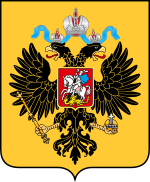Honorary Peace Judge
The honorary peace judge was an honorary post in the Russian Empire and the three Baltic Sea Governments . Their importance lay in the fact that they belonged to the area of communal and local Zemstvo ( self-government ), as they not only exercised jurisdiction to a limited extent, but also had a say in financial and economic administration .
Russian Empire
In the Russian Empire, the district's honorary peace judges were elected every three years by the district estates and city council assemblies in Moscow , Saint Petersburg and Odessa . For the selection process , the local district marshal, the mayor of the district town and the incumbent justice of the peace created a list of candidates who were suitable for the office of justice of the peace. The group of people available for selection should have an appropriate level of knowledge and be able to prove that they own real estate or land worth 3,000 to 15,000 rubles . The list submitted to the governor has been checked and published, and then the courts of honor are elected according to the number of districts in the respective governorate. After they have been elected and confirmed by the first Senate Department, the elected divide the districts among themselves and elect a chairman of the Assembly of Justice of the Peace.
“The honorary peace judges are unpaid, they have their own official badge and their own official seal. They choose the permanent place of jurisdiction within the district with the confirmation of the Assembly of Justice of the Peace; However, they have to receive complaints and complaints anywhere and at any time. If a judge of the peace is prevented from attending, his functions are taken over by another judge of the peace of the same group in a predetermined order. The justice of the peace are under the control of the assemblies of justice of the peace, but these are under the supervision of the Senate. The justice of the peace can only be appalled by their office on the basis of a court judgment. Special instructions for these are drafted by the assemblies of justice of the peace and approved by the Minister of Justice; Both the justice of the peace and the assemblies of justice of the peace have to submit an annual report on their business activities to the same. "
Honorary Peace Judge (Baltic States)
In the three Baltic provinces ruled by the Russian Empire , the honorary peace judges (also justice of the peace) performed their duties on a voluntary basis and were appointed by the responsible minister of justice of the Baltic provinces. Their term of office was set for three years. The selected persons, who did not have to prove any previous legal training, should belong to a high level of wealth. When making the selection, special emphasis was placed on life experience and knowledge of local conditions. Even in Tsarist Russia (1547–1721) a judge (Russian Судья) had to be at least 40 years old. Due to a lack of legal training and previous knowledge, they seldom exercised the office as a single judge, they were mostly participants in the meetings of the professional courts, and they also took part in meetings of justice of the peace and as auxiliary judges at the district court. In the later Baltic republics no honorary peace judges were appointed. In Latvia professional judges could be appointed honorary judges (goda tiesnesis) after their retirement, who could then be appointed as assistant judges if necessary (source: ReorgVO Art. 8 and Baltic Citizenship 104).
See also
literature
- ReorgVO Art. 8
- Balt. Citizenship 104.
Web links
- Baltic Historical Commission: E - Baltic Legal Dictionary
- Julius Albert Wilhelm von Eckardt, 1870, Russia's Rural Conditions since the Abolition of Serfdom, Chapter I. On the Agrarian Organization of Russia
Individual evidence
- ↑ See district marshal in: Baltic Legal Dictionary (K) [1]
- ↑ Compare: Julius Albert Wilhelm von Eckardt , 1870, Russia's rural conditions since the abolition of serfdom , Chapter I. About the Agrarian Organization of Russia [2]
- ↑ Балязин В. Н .: Неофициальная история России ( "Unofficial History of Russia"), 2007. ISBN 978-5-373-01229-4
- ↑ The ordinances on the reorganization of the judiciary and the building authorities in the Baltic Governments and the rules governing the implementation of the aforementioned ordinances with an explanation of the motives on which they are based. Vol. 1, Ordinance on the Reorganization of the Judiciary [3]
- ↑ Baltic Citizenship: An attempt at a common understanding of the fundamentals of political and social life in the Baltic provinces of Russia. First part [4]



